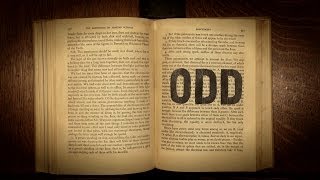(单词翻译:单击)
Mysteries of vernacular: Odd, different from what is usual or expected.
通用俗语的谜团:Odd,指不寻常或出乎意料的事物。
Though the modern word odd has many meanings, mathematical or not,
尽管odd这个词在今天有很多意思,无论是否和数学相关,
they can all be traced back to the Indo-European root uzdho, meaning pointing upwards.
所有的意思都可以追溯到印欧语系词根uzdho,意思是“指向上方的”。
Inspired by the idea of a vertical-pointed object,
由于受到垂直指向物体的启发,
speakers of Old Norse modified this root into a new word, oddi,
古挪威语使用者将该词根改为另一个新的单词oddi,
which was used to refer to a triangle, the simplest pointed object geometrically speaking.
这个词用来指代三角形这种最简单的几何有点物体。

A triangle with a long point, like an arrow head or a piece of land jutting out into the sea,
人们发现,一个稍长的三角形,例如一个箭头或一块伸入海洋的陆地,
was recognized to have two paired angles and a third that stood alone.
是由两个成对的角和第三个单独的角组成。
And over time, oddi began to refer to something that wasn't matched or paired.
随着时间的推移,oddi开始指代那些不对称或不成对的事物。
In Old Norse, oddi also came to mean any number indivisible by two.
在古挪威语中,oddi也指“任何无法被2除尽的数字”。
And odda mathr, the odd man, was used to describe the unpaired man whose vote could break a tie.
而odda mathr,也就是the odd man,它用来表示“投出打破平局一票的人”。
Though the English never called a triangle odd, they did borrow the odd number and the odd man.
尽管英国人从未用odd指代三角形,但他们却借用了odd一词中“奇数”和“投出决定性一票的人”的含义。
And finally, in the 16th century, the notion of the odd man out gave rise to our modern meaning peculiar.
到了16世纪,“剩下的人(the odd man out)”最终发展为今天“怪异”的意思。


